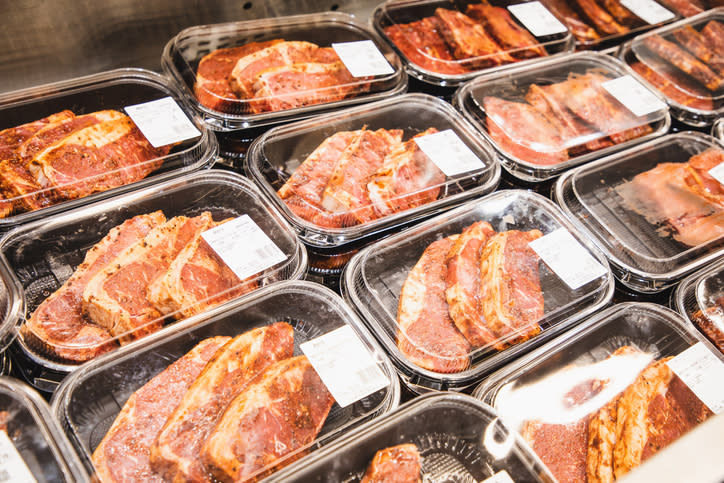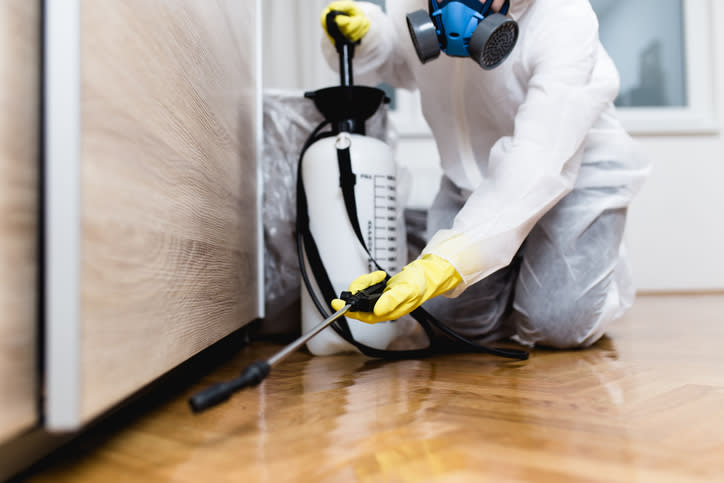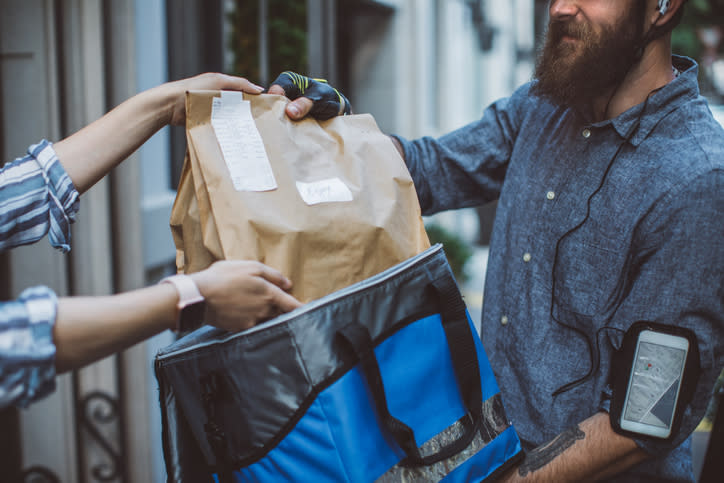"We Don't Clean The Ballpit, Like, Ever:" 28 Employees Reveal The Shocking Industry Secrets They're Not Supposed To Tell Customers

Recently, I asked BuzzFeed readers like you to share the best-kept secrets in the industries they work in. Let's just say...there are certain jobs I am looking at in a whole new light after reading some of these. So, without further ado, here are 28 industry secrets that customers aren't supposed to know:
Note: Responses have also been pulled from this reddit thread.
1."I used to work for a frozen foods company that processed and packaged frozen vegetables. The same exact veggies, from the same exact truck, from the same exact farm, were used for multiple different brands of frozen vegetables. They're all the same. Do yourselves a favor and save a couple of bucks by buying the 'store brand' over the name brand. The only time it’s a different product is if you buy organic."

2."I work at a trampoline/adventure park. We don't clean the ballpit, like, ever. Some kid peed in there once, and they just told an employee to stick a mop in there. When we do clean it (like once a year), the number of phones, vapes, socks, etc, is actually disturbing. We're supposed to clean it like 2-4 times a year. Also, we never clean the baby changing stations. It didn't click to me to maybe wipe it down. If I'm on the bathrooms, it's now added to my to-do list."
3."I worked as a front desk hotel clerk for several years in my twenties. One of the most valuable things I learned was that when you find a good deal with a third party online (like Hotwire or something), it's better for both you and the hotel if you then call the hotel and ask to speak to the front desk manager, then ask them to match the price you found online. Usually (especially if they have any good sense), they'll do it."

"Plus, if there is a mess up when you book through a third party, there's often absolutely nothing the hotel can do about it, as you'd have to go through the booking agency to fix it. But if there's a mess up and you booked through the hotel directly, we can fix it for you. Another benefit is that booking directly brings the hotel more money because they have to pay the third party when you use them, so they're more likely to get you a deal if you work with them. My husband and I did this to make our reservation for a hotel in Orlando near Disney, and they not only matched the price but even went down a little lower for us. Not everyone will do it, but it's worth a shot."
4."A company I used to work for did live chat support. Unbeknownst to customers, the support engineers could read what customers were typing before they hit send. Be careful what you say to tech support is all I can say!"
5."I sell new homes. I've sold about 1500 of them thus far. My biggest piece of advice is to get a home inspection if you buy a new home. Probably fewer than 50 of my buyers have gotten home inspections. Every single one of them found something important that we wouldn't have addressed otherwise."

6."I worked as Manager of the Housekeeping Department of a major Florida resort. Handling ‘lost and found’ was one of my responsibilities. We were told NOT to call previous guests who left valuable items because to do so just might result in an unsuspecting spouse finding out that their partner was there cheating on them. Because of this hotel policy, I got to keep a brand new pair of shoes today and gave my daughter a diamond ring that was left behind."
—Anonymous
7."Most big-box grocery store cakes are not baked on-site. They are shipped to the stores frozen and decorated to order. This is why you can quickly get a low-priced sheet cake from a big-box grocery store but might pay a lot more and wait longer for a smaller bakery to produce a similar result."

—Anonymous
8."Private colleges and universities offer prospective students very good grants and scholarships and point out that the cost makes them comparable to state schools. As a high school teacher, when a parent would talk about how reasonable their child’s college costs would be, I would ask if those rates were guaranteed for four years. They never were. I would also point out that classes for juniors and seniors were more challenging and that the extracurriculars for which the school was giving scholarships were, almost certainly, more than an upperclassman could manage. The factual example I would give was of a former student who went to a private university for nursing and had an athletic scholarship. To complete clinicals (on-site nursing training) while traveling to competitions was incredibly difficult. The school was in the driver’s seat at that point. If the student quit the sport, the student’s tuition costs went up while freeing up money for the next prospective student."
"If the student transferred, many of the credits would need to be repeated. Parents often ended up writing much larger checks than expected, and/or students would have much larger loans than expected."
—Anonymous
9."Every call center I've worked at (over a 20-year span) strongly discouraged representatives from offering to connect callers to a supervisor, even when we knew that the caller's situation could not be resolved by an ordinary representative (because it required some kind of special access or override). Some call centers would be so strict about it that you would be penalized even just for hinting broadly that the caller needed to ask for a supervisor. So be aware: as a caller with a problem or complaint that the representative does not seem willing (or able!) to explain or fix, often you have to politely but DIRECTLY ask to speak to a supervisor."

"Mind you, there's no point in abusing this, because being demanding after being told 'no' certainly doesn't guarantee that the supervisor will, or CAN, fix your problem. Not everything that the customer wants or even legitimately needs is even possible (or, in some cases, legal). But there are many things, especially anything that's an exception of some kind, that only higher rank people in the company have the authority to do."
10."Many, many moons ago, I worked at the dry cleaners as a teen. The majority of clothing that is labeled 'dry clean only' is thrown into a regular washer on a cold delicate cycle. It’s the steaming of the clothes that makes you think they've been dry-cleaned. 99% of the things they do with your clothes at the dry cleaners, you can do yourself at home."
—Anonymous
11."When you see marinated chicken, beef, fish, pork, or poultry products at the market sold by the pound, chances are the cut is past its prime, and they are just trying to sell an old cut. Buy it fresh and marinate it yourself if you can."

12."I’m a rideshare driver on the weekends. The price you are charged is not even close to the amount the drivers are paid per ride. In my experience, rideshare companies, on average, keep 55% of the fare. If the app tells you there are 10 drivers nearby, but no one accepts your ride request, it’s because the pay quoted is too low and no one wants it. Sometimes as a result, the area will suddenly develop a massive surge so that riders get overcharged and drivers get paid what the ride should have paid to begin with."
13."Many bakeries don’t make their croissants from scratch; they purchase frozen croissants from a distributor and bake them in-store. Unless the bakery specifically specializes in croissants, chances are that the croissants you would get at your local bakery are the same ones you could buy in the grocery store’s bakery department for cheaper."

—Anonymous
14."I worked at a restaurant. Service can depend on which manager or lead is working that day. I can't say this to customers, but if I could, most explanations would go like this: 'The reason I'm giving you smaller portions is because the manager says so. Yes, you had bigger portions another day because a different kitchen lead was in the back monitoring, and they didn't care. Sorry, we are out of that item; it'll be 10 minutes. No, I can't grab it from the other line. Yes, I know the other day we grabbed some for you, but the other manager allowed it, and this one doesn't.'"
15."I work in pest control. Termites are a seasonal nuisance; they swarm in late March to April. They usually fly to the windows but could be all over the inside of houses too, causing panic-related phone calls to us for service. What we can never tell people is that you can kill them with a spritzer of soapy water, hairspray, Lysol spray, or almost any aerosol. Instead, we say you need our specially formulated chemicals and to sign this contract! Job security."

16."In the late '80s, I worked at a well-known retail store that's still in business today. Whenever we heard over the PA that 'Mr. Green is in the building,' certain departments like mine that had low theft had to go to the department that sold high-end coats because there were two or more black people in that department. I wasn't there long, and the day I quit, it happened again. I let every Black customer know what 'Mr. Green' meant on my way out."
17."Your delivery driver makes $2-3 per delivery before a tip. The company pockets basically all of the delivery fee and all the other fees they charge you. That means if there’s no tip, they could drive 10 minutes to the store, wait 5 to 10 minutes for your order, and then drive however long to your house. That would mean making $4 an hour while also putting miles on their car and using their own gas. I think a lot of people don’t tip because they think the delivery fee goes to the driver, but it doesn’t."

18."I worked in a creamery making butter for eight years. A popular imported brand of butter would come in from overseas and be already two years old. We’d convert it into sticks, and it would be magically good for another year. Expiration dates mean nothing."
—Anonymous
19."I worked at a bar. Often, patrons would buy the bar ladies a round of drinks. We would all pick the same drink — which was clear — and take shots of it. What our patrons didn't know was that there were two beverages in the same kind of bottle, and both were clear. While they thought they were buying us alcohol, they were actually buying us shots of water and paying the same price."

—Anonymous
20."When a customer didn’t know which model of a product to buy, I would steer them heavily to one specific brand. It was a good, solid brand, but not the best. This particular brand had a point system in which you gained points every time you sold anything from their brand. Points could be used to buy prizes or products offered through their catalog. You would be amazed how much more I learned about this product line over the others just because of this, thus helping me to sell more."
21."I work for one of the biggest auto parts companies in America. We charge a ridiculous amount for batteries and never put them on sale. The company knows that when people are desperate, they’ll pay whatever they have to. Most people don’t know that we price match with our competitors; all they have to do is ask. We’re not allowed to say anything if they don't ask, though. Plus, we can get fired for telling people they can get cheaper batteries elsewhere, like at a hardware store or big box location. We also have to offer the most expensive battery first, trying not to let them know there is a cheaper option."

22."I work in university admissions. We are not supposed to advertise that at our school, we can raise the amount of money students get in scholarships if their final transcript shows a higher GPA than the one they submitted at the time of acceptance. It would make the business less money if we were to publicly advertise it through our communications."
"We don’t compare final GPAs to GPAs at the time of acceptance (which, on the bright side, allows students who have a dip in their GPA not to lose their scholarships), so we don't keep track of increases, either. It’s a shame because these students work hard and could get an even bigger scholarship, but they don’t know it. However, I tell every student about it when they ask about scholarships, even if they aren’t specifically asking about a raise. I’d rather be bad for the business than bad for the students."
—Anonymous
23."I was a hairstylist. At my salon, they wouldn't give you a raise unless you sold a certain amount of their hair products. Being booked all the time, extremely talented, and bringing in new clients didn't matter — it was all about how much product we could sell."

24."Although I’m a childcare professional with a Master’s degree that includes diagnostics, I am not able to point parents in the right direction when I see signs of autism, developmental disabilities, ODD, learning disabilities, or anything. It’s very frustrating. I could save the parents a lot of wasted time trying to figure out what's wrong, but I'm not allowed."
—Anonymous
25."I worked in radio for 20 years. Those 'Second Date Update' or 'War of The Roses' kind of bits you hear on morning radio shows are all staged. They're actors. Think about it — who actually answers unknown numbers these days?! They're still entertaining, though!"

—Anonymous
26."I worked for a major international shipping company. They were so big that they did not care AT ALL about how packages were handled. I worked part-time during their main shift — which was at night — for single-day shipping. Punching, kicking, throwing, stomping....it was all common. Everyone who worked there hated their jobs so much and was so sick and sore from the poor working conditions that it was pretty common to take frustrations out on the packages. The company could just reimburse the shippers if anything was damaged, though most people never held them accountable for it anyway."
"The only time people couldn't abuse the packages was when new iPhones came out. An executive from Apple would show up and watch us load and unload every single box, and after each shift, we'd have to empty our pockets and take off our shoes to prove we didn't steal any."
—Anonymous
27."As a nurse, we are not allowed to tell a patient if their doctor is terrible. We can’t even recommend getting a second opinion. Working in a particular ICU, we nurses used to refer to one surgeon as ‘The Butcher.’ His botched surgeries were pretty awful. Some of us even complained about it to the higher-ups but were told that he brings money to the hospital, so just keep quiet. Pay attention if a nurse is trying to be tactful about a doctor (my go-to when asked about that surgeon was saying he was a hard worker). There are surgeons that are amazing and others who I wouldn’t allow to do surgery on a dead cockroach if I had any authority."

—Anonymous
28.And finally, "I worked for a top 5 advertising agency. Despite strict client NDAs and conflict rules, we routinely shared their confidential brand information to try and win new clients."
—Anonymous
Now it's your turn! Do you have a juicy industry secret you're not allowed to tell customers like these? If so, tell us about it in the comments below or via this 100% anonymous form.
Note: Reddit comments have been edited for length and/or clarity.
If you enjoyed these insider secrets, you can read 19 more of them here.

